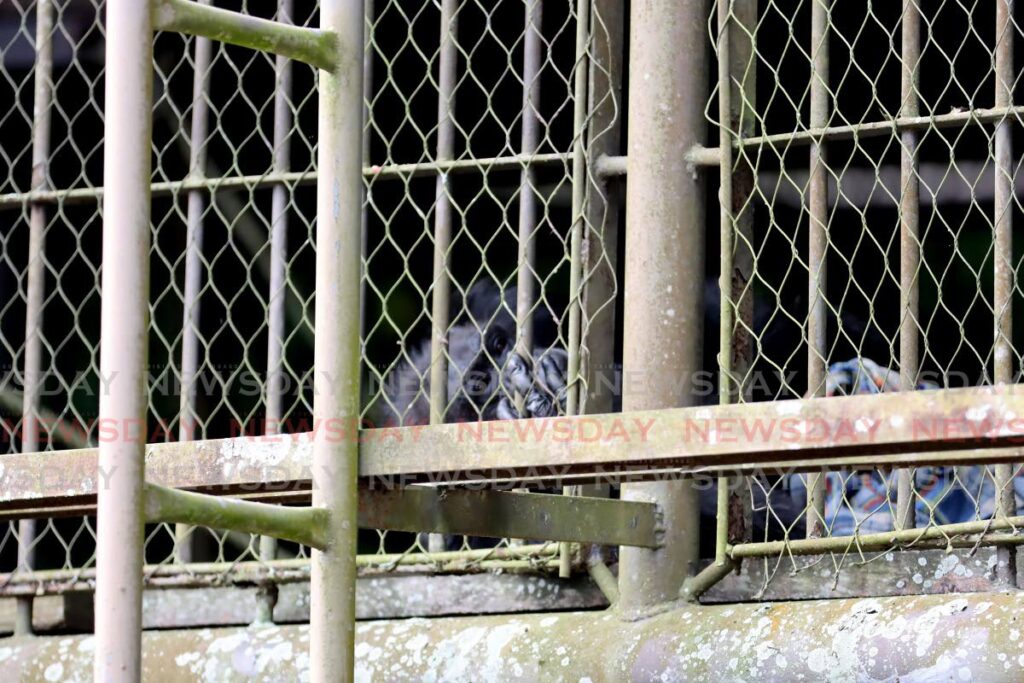TTSPCA urges zoo: Don't import any more exotic animals

THE TT Society for the Prevention of Cruelty to Animals (TTSPCA) is asking the Emperor Valley Zoo and Agriculture Ministry to "reconsider" importing any more exotic animals to be put on display.
However, the zoo says this "complaint" is "null and void."
In a press release on October 4, TTSPCA chairman Sita Kuruvilla said the public should be taught that it is wrong to "confine animals in cages.
"The zoo opened in 1952 at a time when it was considered acceptable to confine animals in enclosed spaces for the entertainment of the public. That time is long past."
She pointed to Sudi, a 50-plus-year-old chimpanzee at the facility who does not have a companion.
"These highly intelligent primates require constant stimulation and companionship. In the best zoos, great apes live together in spacious enclosures modelled on their habitat. Confining them to limited spaces can lead to distress and self-destructive behaviours."
She continued, "What about the giraffes, born to roam the vast savannas of sub-Saharan Africa, now living out their lives in an enclosure at the back of the zoo?
"They may be an attraction for visitors but does this compromise their welfare?"
She also mentioned Jack, a red kangaroo who died of heart disease at the zoo in May, saying there was "great public concern" about his welfare.
She questioned whether the zoo had trained vets, as well as dedicated facilities to support tests and procedures done to animals there.
"The fundamental question that must be asked is ‘What is the purpose of the Emperor Valley Zoo?’ The website for the Zoological Society and Facebook page provide very little information. Is it education? Is it conservation?
"If there are constraints to the ability of the Zoological Society to manage the care of exotic species, should we not focus on our native species to encourage respect for our natural environment and the species that inhabit it?"
She suggested more educational promotion be done, as well as virtual and interactive displays being included at the zoo.
"Should we not be teaching our citizens that it is wrong to confine animals to cages?
"The thriving illegal trade in wildlife into this country has resulted in thousands of animals, particularly monkeys and parrots, living lives of misery, in solitary confinement."
She added, "We have a long way to go if we are to educate our citizens to value our natural environment. I suppose we are still stuck in the past and we continue to view animals as entertainment. This does not bode well for the future."
Asked about this on October 4, zoo consultant John Seyjagat said part of the zoo's mission is to educate the public on local and non-native species.
"And we have an animal acquisition and disposition policy which we follow.
"Before we get any exotic animals, we determine if we have the technology to keep them, the necessary staff, skillset...We look at whether there is space to breed that animal or if we would only bring one of a particular gender. We do all of that."
He added, "So we don't adhere to that call. Her complaint is null and void."
He said many do not see the amount of work behind the scenes at the zoo.
"There are regular (health) screenings, a vet does daily checks on the animals, we do animal enrichment daily, which is logged, we look at the psychological health of the animals."

Comments
"TTSPCA urges zoo: Don’t import any more exotic animals"